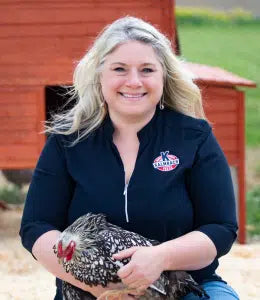Can Ducks Eat Chicken Feed?

Can ducks eat chicken feed? We receive this question quite frequently at Kalmbach Feeds®. The answer is yes, in most cases. Ducks do have some unique nutritional requirements, but most of those unique requirements are necessary while they are growing. Once ducks reach sexual maturity, they can usually be fed the same thing as your chickens. Let's dive a little deeper into the unique nutritional requirements of ducks and what to look for in a layer feed that you plan to feed them.
Unique Nutritional Requirements for Ducks
As we have discussed in previous articles, ducks grow exceptionally fast. Because of this, ducks require a lot of energy and extra nutrients to maintain their structure, bone strength, and body confirmation.
Ducks also need high levels of niacin. Niacin is a B vitamin, Vitamin B3, to be exact. Most animals can easily convert tryptophan – an essential amino acid – into niacin. However, ducks are not very good at this process. Therefore, they require a lot more niacin from their diet.
Ducks suffering from niacin deficiency may have legs that swell at the hock or become bowed. If not appropriately treated, walking will eventually become very difficult and uncomfortable for these ducks. That is why choosing a high-quality starter/grower feed that meets the niacin requirements for growing ducks is very important.
As ducks age, however, their niacin requirement starts to decrease. The niacin requirement in feed for adult ducks is about 20% less than that of a baby duck. At this stage, the niacin requirement is near the level for adult chickens. Also, ducks consume more feed daily than chickens to meet their daily niacin requirement with a good quality layer feed.
Key Differences Between Duck Feed vs Chicken Feed
How Will I Know if a Layer Feed Will Work for My Ducks?
Not all layer feeds are created equal. Adult chickens do have slightly lower niacin requirements than adult ducks. If a layer feed is formulated to meet only the bare minimum requirement for chickens, then it may not be the best option for ducks, too. Check the ingredient listing on your feed tag for a niacin supplement. If you still aren't sure, ask your supplier! We get this question all the time, and we are happy to help with your inquiries. All of our Kalmbach® layer feeds are formulated with duck layers in mind and would make great feed options.
What if I Still Want to Supplement?
Though it is often optional with most good-quality layer feeds, some duck owners may still want to supplement the diet of their layer ducks. A common supplement may be leafy greens, which are loaded with vitamins. Dried Brewer's Yeast is also a common niacin supplement for duck owners. You can usually find Dried Brewer's Yeast at your local feed store, drug store, or online.
Can I Feed Too Much Niacin?
Too much of anything is never a good idea. However, the toxicity threshold for niacin is high since niacin is a water-soluble vitamin, which means that your birds don't accumulate large vitamin stores in their body reserves. To ensure you provide the best nutrition for your layer ducks, pick a good quality layer feed that will meet their nutrient needs. Don't hesitate to contact the feed company if you have questions or aren't sure about the best feed option. And, most importantly, enjoy the time with your ducks!
Can Ducklings Eat Chick Feed?
Ducklings have different nutritional needs compared to adult ducks and chickens. While they can consume chicken feed in a pinch, it is not ideal. Ducklings require higher protein levels and more niacin than what is typically found in chicken feed. A specialized feed designed for ducklings from hatch through their entire life is the best option to ensure they get the essential nutrients they need for healthy growth.
What Can Ducks Not Eat?
Like many other animals, ducks should avoid certain foods that can harm their health. Common foods to avoid include bread, which offers little nutritional value and can cause malnutrition. Also, ducks should not eat avocados, onions, chocolate, or caffeinated products, as these can be toxic. Processed foods high in salt, sugar, and fat should also be avoided. Always ensure that ducks have access to fresh water and a balanced diet suitable for their specific nutritional needs.
Browse Kalmbach's Chicken Feed and Duck Feed Varieties
Explore our high-quality feeds specifically formulated to meet the nutritional needs of chickens and ducks. Visit our website to find the perfect feed for your flock.
